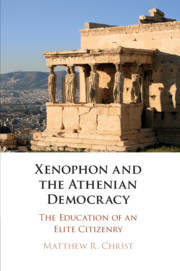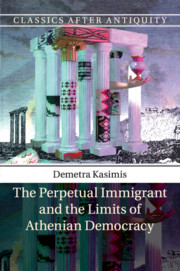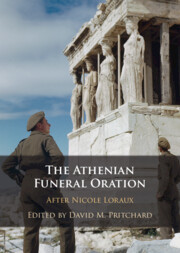Xenophon and the Athenian Democracy
The Education of an Elite Citizenry
- Author: Matthew R. Christ, Indiana University
- Date Published: September 2021
- availability: Available
- format: Paperback
- isbn: 9781108797757
Paperback
Other available formats:
Hardback, eBook
Looking for an inspection copy?
Please email [email protected] to enquire about an inspection copy of this book
-
This book seeks to understand Xenophon as an elite Athenian writing largely for an elite Athenian audience in the first half of the fourth century BC. It argues that Xenophon calls on men of his own class to set aside their assumptions of superiority based on birth or wealth and to reinvent themselves as individuals who can provide effective leadership to the democratic city and serve it as good citizens. Xenophon challenges, criticizes, and sometimes satirizes the Athenian elite, and seeks to instruct them concerning the values, knowledge, and practical skills they will need to succeed as civic leaders. Xenophon is thus best understood not as an aristocratic dinosaur who is out of place in a democratic setting, as some have assumed, but as a thoughtful and pragmatic reformist who seeks to ensure that meritorious members of the elite step forward to lead within the democracy.
Read more- Explores the significant continuities in Xenophon's political thinking across his Athenian works
- Contextualizes Xenophon's writings in the aftermath of the disastrous reign of the oligarchic Thirty (404/ 3 BC), and explores their significance for contemporary elite Athenian readers
- Translates all Greek into English and uses clear language throughout in order to maximize accessibility
Reviews & endorsements
'… Christ's book contains interesting observations which begin to point in a different direction, especially his sensitivity to the differences in form between Socratic dialogues and treatises like Poroi and their implications for Xenophon's 'message' … this just goes to show that careful reading of Christ's book is handsomely repaid.' Luuk Huitink, Bryn Mawr Classical Review
See more reviews'Christ's careful reading of the chosen texts and their juxtaposition create a coherent and persuasive argument that enhances prior readings by tying interpretation to the political environment of Athens in the late fifth/early fourth century.' Fiona Hobden, Polis, The Journal for Ancient Greek and Roman Political Thought
Customer reviews
Not yet reviewed
Be the first to review
Review was not posted due to profanity
×Product details
- Date Published: September 2021
- format: Paperback
- isbn: 9781108797757
- length: 225 pages
- dimensions: 228 x 153 x 13 mm
- weight: 0.343kg
- availability: Available
Table of Contents
Introduction. Xenophon the Athenian
1. Athens in crisis in the Hellenica
2. Politics and the gentleman in the Memorabilia
3. Work, money, and the gentleman in the Oeconomicus
4. The education of callias in the symposium
5. Xenophon as expert, advisor, and reformer in the Hipparchicus and Poroi
6. Xenophon the democratic orator: the politics of mass and elite in the Anabasis
Conclusions. Elite readers, elite citizens
Bibliography.
Sorry, this resource is locked
Please register or sign in to request access. If you are having problems accessing these resources please email [email protected]
Register Sign in» Proceed
You are now leaving the Cambridge University Press website. Your eBook purchase and download will be completed by our partner www.ebooks.com. Please see the permission section of the www.ebooks.com catalogue page for details of the print & copy limits on our eBooks.
Continue ×Are you sure you want to delete your account?
This cannot be undone.
Thank you for your feedback which will help us improve our service.
If you requested a response, we will make sure to get back to you shortly.
×





